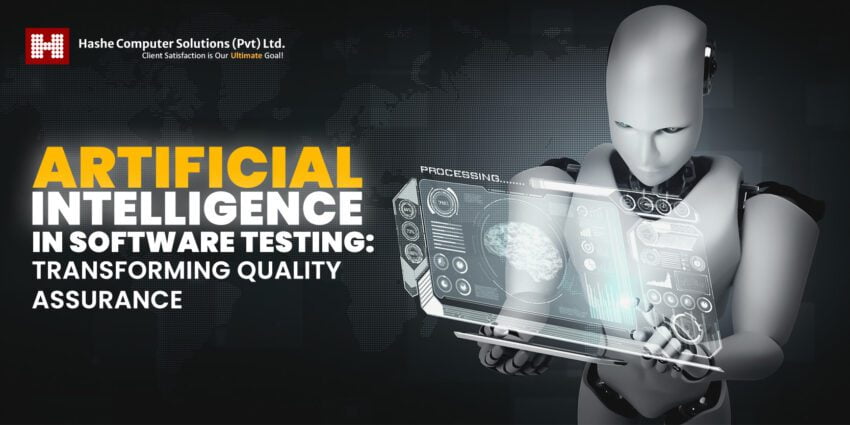
In the past few years, there has been a game-changing breakthrough in the realm of software testing: the incorporation of Artificial Intelligence (AI). AI is reshaping several sectors, including software testing. It offers robust tools and techniques that may significantly improve testing procedures.
As you can see, conventional testing techniques frequently depend on human labor, which can lead to delays, costs, and errors. However, AI? It’s a whole different tale! It is capable of performing a large number of testing jobs independently, and it does it more quickly and accurately. It has the ability to generate test cases, identify complex code patterns, and even forecast issues before they become significant difficulties.
Not only can AI-powered testing expedite processes, but it also frees up human testers to concentrate on the more complex and creative aspects of their work. That is how it ultimately boosts the software quality standard.
Features of AI tools
Generate test cases via machine learning algorithms.
The creation of test cases has entered a new age with AI in software testing. Experts are now employing machine learning techniques to create better, more dynamic test scenarios. There are two main benefits to this approach.
Test data generation
Machine learning may help generate varied and appropriate test data. AI algorithms can create test data that encompasses numerous situations by analyzing past data and application behavior. It guarantees that the software is extensively tested in various conditions, assisting in detecting any problems that could otherwise go undetected.
Test data and data entry are connected through the process of populating systems with accurate and relevant inputs required for testing. Automated data entry ensures that the test environment is consistently filled with the necessary datasets, eliminating manual errors and saving time. One of the benefits of data entry automation is its ability to quickly and accurately prepare the data needed for generating diverse test scenarios. This synergy enhances testing efficiency and ensures that software is rigorously evaluated under realistic conditions.
Test script generation
Automating the creation of test scripts with AI-driven solutions may save testers a significant amount of time. These tools automatically generate test scripts that simulate user interactions by analyzing the user interface and behavior of the application. It improves the dependability of test cases and expedites the testing process by lowering the possibility of scripting mistakes.
Predictive analytics to find defects
The predictive skills of AI help spot defects more efficiently.
Early defect identification
In order to identify parts of the code that are more likely to have errors, machine learning models can examine software metrics and historical defect data. It increases productivity and problem detection rates by allowing testers to concentrate on the most essential elements of the application and prioritize their testing efforts.
Root cause analysis
Artificial Intelligence can help identify the underlying causes of the identified faults. AI-powered solutions can pinpoint the precise lines of code or modules causing errors by examining test results and application logs. It enables developers to fix problems more quickly while speeding up the debugging process.
Automated testing and monitoring
Artificial Intelligence is changing how tests are conducted and monitored.
Continuous Integration and Continuous Testing (CI/CT)
AI-enabled testing technologies facilitate the idea of continuous integration and continuous testing (CI/CT) by integrating smoothly with the software development process. It implies that changes may be checked right away by enabling tests to run automatically whenever new code is committed. AI may optimize the testing pipeline by prioritizing and rerunning tests in response to code modifications.
Monitoring application behavior in real-time
AI-powered monitoring systems can continually track an application’s behavior in real-time. They enable proactive intervention by promptly identifying abnormalities, performance bottlenecks, and security issues. Teams can respond quickly to glitches with this real-time feedback loop, which minimizes downtime and improves user experience.
Software development processes that leverage AI-powered testing tools and methodologies have the potential to enhance software product quality by increasing testing efficiency. In today’s competitive world, software teams need to be able to respond to ever-increasing expectations for faster and more dependable product releases. These enhanced capabilities help teams do just that.
How does AI help with software testing?
Let us examine the potential long-term benefits of AI for software testing.
Codeless automation
Generating codeless scripts is one of the key benefits of utilizing AI in test automation. Artificial Intelligence assists in converting plain English test scripts into real code using Natural Language Processing (NLP). The advantage of codeless testing is that it empowers any of your team members to create tests, improving accessibility and user-friendliness throughout the process.
Automated test generation
AI may help analyze user behavior, underlying code, and software behavior, which can lead to the autonomous generation of test cases. This feature is helpful since it reduces the time and human labor required to create test cases and thoroughly examines different features.
Eliminating the Flaky Test
Testing teams have to spend a lot of effort figuring out if application issues or faulty test case design are to blame for a test failure. These test failures, also referred to as flaky tests, might unduly delay software delivery by delaying releases. AI can help teams create more reliable test cases and find trends in random test failures, which will speed up the process of solving the problem of flaky tests.
Enhanced test coverage
AI assists in analyzing large amounts of data and presents additional testing situations that would have gone unnoticed. This improved coverage also enables AI to find and simulate a broader range of test cases, resulting in more extensive testing and, ultimately, higher-quality software. As a result, the software quality increases, and the testing process becomes more thorough. High test data volumes and complicated test scenarios are easier to manage via AI than conventional testing methods.
Adaptive test maintenance
Maintaining test scripts in case of any software’s UI or functionality change is a well-known difficulty in test automation. In certain situations, traditional automated tests may not pass. AI-powered testing solutions may learn from application changes, whether tiny UI tweaks or significant functional improvements, and update test cases accordingly. This learning capacity reduces the amount of maintenance work and boosts the robustness and dependability of test cases, ensuring their efficacy even if the program under test changes.
Visual validation
In visual testing, AI may compare an application’s graphics to anticipated outcomes. AI systems can identify differences in user interface images from an application by comparing them to a reference image. These differences might be as evident as a button that isn’t aligned correctly or as minute as a color shade variation. It is helpful when testing across various gadgets, browsers, and screen sizes.
Increased accuracy
Manual testing is inevitably fraught with human error and classic test automation challenges when dealing with dynamic data. The test analyzes how different pieces are anticipated to function by employing machine learning, lowering test authoring time. These features can improve the accuracy and caliber of your testing while sparing your team several hours of inspection and rectification.
Reduce cost
Artificial Intelligence has the potential to drastically lower testing costs over time by operating more efficiently, using less human labor, and minimizing mistakes. Faster testing cycles and better software demonstrate the return on investment of AI-powered testing solutions, even though there may be an initial cost.
Conclusion
Artificial Intelligence (AI) is more than merely a trendy buzzword; it’s revolutionizing the software quality assurance industry. AI is like an effective partner in this mission and is performing a lot of heavy work.
Businesses definitely ought to experiment with AI-driven testing. It has several prominent benefits, including increased test coverage, quicker testing, less manual work, and more accurate defect identification. However, it is critical to approach this with caution. One needs to address concerns like data security, staff training, and integrating AI into your daily operations.
It isn’t just about technology; it’s an entirely new paradigm that values innovation and continuous improvement. AI testing helps you remain ahead of the competition in a constantly changing environment besides producing superior software.
Are you looking for the best IT providers for your IT projects? Look no further than Hashe! Hashe Computer Solutions is a leading IT solutions provider that offers world-class software, mobile application, web development, and digital marketing services. Contact us for the best web design solutions!
Keep following us for more tech news! Check out our Social Media Pages
Was this helpful?
Last Modified: January 14, 2025 at 3:40 pm
125 views















